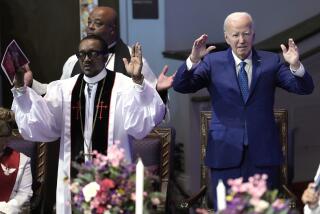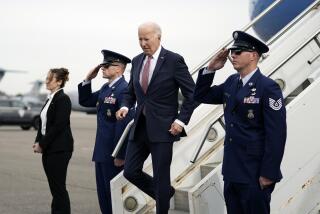Obama parts with Trinity church
ABERDEEN, S.D. — Barack Obama announced Saturday that he and his wife had resigned as members of their Chicago church in the wake of controversial remarks from its pulpit that have become a serious distraction to his presidential campaign.
In a letter dated Friday to the pastor, the Rev. Otis Moss III, Obama said he and his wife, Michelle, had come to the decision “with some sadness.” But they said their relations with Trinity United Church of Christ “had been strained by the divisive statements” of the retiring pastor, the Rev. Jeremiah A. Wright Jr., “which sharply conflict with our own views.”
The Illinois senator’s decision to break with the church that he has credited with shaping his faith came after months of controversy over racially charged remarks Wright made to the 8,000-member congregation on Chicago’s South Side.
His announcement came on a busy day as Democratic officials settled the thorny issue of how to count disputed Florida and Michigan delegates, giving each half a vote. That puts Obama within reach of clinching the nomination in the last primaries, today in Puerto Rico and on Tuesday in South Dakota and Montana.
In a news conference after a campaign stop in this prairie town, Obama cited the uproar over inflammatory remarks from the pulpit last week by Father Michael Pfleger, a Catholic priest who appeared as a guest speaker at the church.
Pfleger mocked Hillary Rodham Clinton, saying she was a white elitist who felt entitled to the nomination and was annoyed that “there’s a black man stealing my show.”
Obama described Pfleger, the white pastor of a largely African American parish in Chicago, as a friend who “made offensive statements that have no place in our politics and in the pulpit, that unfairly mocked and criticized Sen. Clinton in ways that I think are unacceptable.”
The grainy video of Pfleger shouting to a packed church has circulated widely on the Internet and renewed the focus on Wright, whose incendiary sermons enveloped the campaign in months past. Wright can be seen in Internet videos shouting “God damn America” and asserting that the Sept. 11 terrorist attacks were brought on by U.S. foreign policy.
“We don’t want to have to answer for everything that’s stated in a church,” Obama told reporters in South Dakota. “On the other hand, we also don’t want a church subjected to the scrutiny that a presidential campaign legitimately undergoes.”
Obama said he and his wife had discussed the decision “for quite some time.”
“We had prayed on it. We had consulted with a number of friends and family members who are also connected to the church. And so this is not a decision I come to lightly. And frankly, it’s one that I make with some sadness.”
The candidate used the moment to remind voters of his Christian faith -- “Trinity was where I found Jesus Christ” -- and said he and his wife wanted to spare the congregation further disruption. Obama said the new pastor’s sermons were also being scrutinized. He said critics were exploiting the most innocuous remarks and news organizations were harassing parishioners.
“That’s just not how people should have to operate in their church,” he said. “It’s not fair to other members of the church who seek to worship in peace.”
Clyde Wilcox, a professor of government at Georgetown University, said that Obama’s departure from his church offered a lesson about mixing politics with faith.
“If campaigns involve pastors as precinct workers, then what they say can be scrutinized as much as any other political supporter,” he said. Obama has careened between damage control and loyalty to his parish. His decision reflected an awareness that the church could be a continuing distraction for his campaign.
“It’s clear that now that I’m a candidate for president, every time something is said in the church by anyone associated with Trinity, including guest pastors, the remarks will be imputed to me even if they totally conflict with my long-held views, statements and principles,” he said.
In a statement, church officials said “saddened by the news” but “understand this is a personal decision.”
The campaign of the presumptive Republican nominee, Arizona Sen. John McCain, declined to comment, a departure after a week in which it has commented repeatedly on Obama’s speeches.
When Wright’s sermons first emerged, Obama tried to calm the controversy with a speech on race in which he presented himself as a unifier who could understand both the black and white experiences in America.
At the time, Obama, while distancing himself from Wright’s remarks, still said he embraced “like family” the pastor who helped him find his roots as he came of age, officiated at his marriage and baptized his daughters.
“I can no more disown him than I can disown the black community” or, he added, his white grandmother, who “on more than one occasion has uttered racial or ethnic stereotypes that made me cringe.”
Weeks later, Obama did disavow Wright after the pastor launched a discourse at the National Press Club in Washington, expressing thoughts that the senator denounced as “divisive and destructive” and out of sync with the message of his campaign. It was after that event, Obama said Saturday, that he and his wife began to consider leaving.
Polls have shown that Obama’s association with Wright, who officially retires from the church today, drove away some voters, particularly members of the working class, whom Obama has worked hard to court.
His split with Trinity could remove a complication to the stepped-up efforts by Obama and other Democrats to reach out more to religious voters.
The Rev. James M. Wall, a minister with the United Methodist Church and former editor of the magazine the Christian Century, called Obama’s decision “a wise political move.” And he criticized Trinity for bringing in Pfleger.
“It was regrettable, because the church knows that every word being spoken behind the pulpit is being taped and scrutinized,” Wall said.
Noting that Obama hasn’t attended services there for months, Wall said his departure would have little effect on Trinity, which has a long history of serving the local South Side community and its mainstream denomination.
“What Barack’s doing is ending the story by leaving the church at this time,” he said. “Pastors come and go, but the congregation is a spiritual community that remains.”
--
michael.finnegan @latimes.com
Times staff writer P.J. Huffstutter contributed to this report from Chicago.
More to Read
Sign up for Essential California
The most important California stories and recommendations in your inbox every morning.
You may occasionally receive promotional content from the Los Angeles Times.











